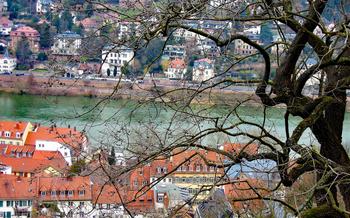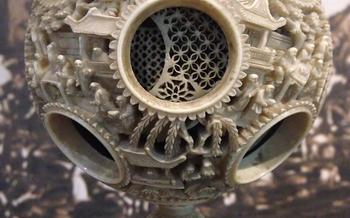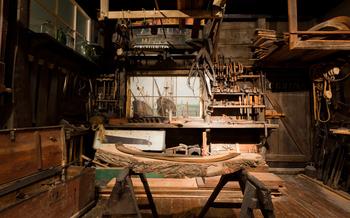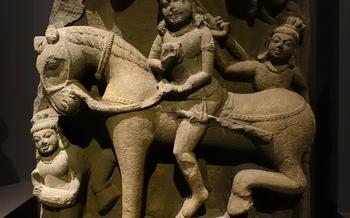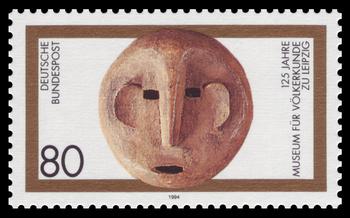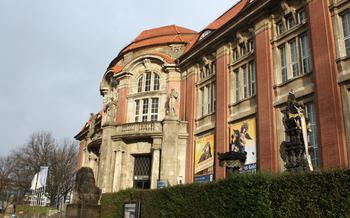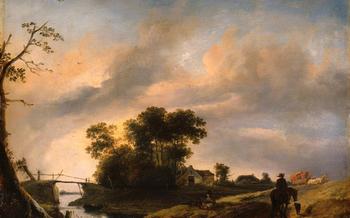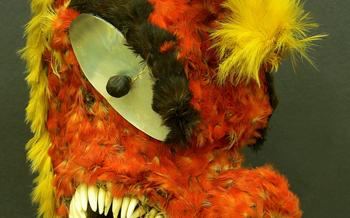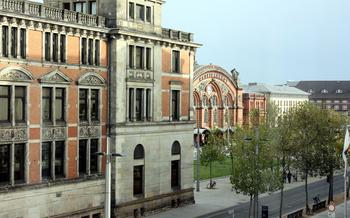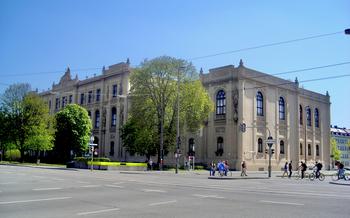
Museum für Völkerkunde
- Museum für Völkerkunde: A Journey Through Diverse Cultures
- A Wealth of Artifacts
- Global Perspectives: A Tapestry of Cultures
- Thematic Exhibitions
- Cultural Encounters
- The Oceanic Collection: A Masterpiece of Cultural Expression
- The African Collection: A Journey into the Heart of Diverse Cultures
- The Asian Collection: Unveiling Artistic and Cultural Treasures
- The American Collection: Unveiling the Indigenous Heritage of the Americas
- Special Exhibitions
- Educational Programs
- Research and Publications
- Museum Shop: Cultural Treasures to Take Home
- Accessibility and Services
- Insider Tip:
Museum für Völkerkunde: A Journey Through Diverse Cultures
The Museum für Völkerkunde in Hamburg, Germany, takes you on a captivating journey through the vibrant tapestry of human cultures from around the world. Established in 1879, the museum boasts a remarkable collection of over 350,000 artifacts, shedding light on the diversity of human expression and the interconnectedness of global communities. Its mission is to promote understanding and appreciation of cultural heritage, fostering diálogo and cross-cultural learning. Whether you're a seasoned traveler, a history buff, or simply curious about the world's diverse cultures, this museum offers an unforgettable experience.
A Wealth of Artifacts
The Museum für Völkerkunde boasts a diverse collection of artifacts that span different cultures and time periods. From ancient pottery to contemporary art, the museum's holdings offer a glimpse into the rich cultural heritage of diverse communities worldwide.
Among the highlights of the collection are cultural artifacts, tools, and weapons that provide insights into the everyday lives of past civilizations. These include intricately carved wooden utensils, beautifully woven textiles, and skillfully crafted weapons that showcase the ingenuity and craftsmanship of our ancestors.
Artistic masterpieces, sculptures, and textiles form another significant part of the collection. From delicate ivory carvings to monumental stone sculptures, the museum's art collection represents the diverse artistic traditions of various cultures. Visitors can admire the intricate details of African masks, the vibrant colors of Oceanic tapa cloths, and the serene beauty of Asian Buddhist sculptures.
Each artifact in the Museum für Völkerkunde holds a story, a testament to the cultural and historical significance of the communities that created them. Through these objects, the museum invites visitors to explore the interconnectedness of human cultures and gain a deeper understanding of the world's rich diversity.
Global Perspectives: A Tapestry of Cultures
The Museum für Völkerkunde takes visitors on a journey across continents, showcasing the cultural heritage of diverse communities from Africa, Asia, Oceania, and the Americas. Immerse yourself in the traditions, rituals, and social practices of indigenous peoples from around the world. Through captivating exhibitions, the museum provides a platform to explore the intricacies of human societies, fostering understanding and appreciation for cultural differences.
Exhibitions delve into the rich tapestry of cultural heritage, highlighting the unique expressions of human creativity and innovation. Discover the vibrant masks and sculptures of African tribes, marvel at the intricate carvings and textiles of Oceania, and explore the ancient civilizations of Asia through their exquisite artifacts. The museum serves as a bridge connecting cultures, promoting dialogue and cross-cultural learning, allowing visitors to gain a deeper understanding of the interconnectedness of our global community.
Thematic Exhibitions
The Museum für Völkerkunde offers a variety of thematic exhibitions that delve into specific regions and cultural practices. These exhibitions provide an in-depth exploration of art forms, historical events, and cultural traditions. Visitors can expect to find interactive displays, multimedia presentations, and engaging storytelling that bring the cultures to life.
Regularly updated, these exhibitions offer fresh perspectives and new insights into the diverse cultures represented in the museum's collection. Whether it's exploring the intricate symbolism of Oceanic art, the vibrant textiles of Southeast Asia, or the ancient traditions of Native American communities, these thematic exhibitions offer a deeper understanding of the world's rich cultural heritage.
One of the highlights of the thematic exhibitions is the focus on contemporary art and cultural trends. The museum collaborates with contemporary artists and cultural practitioners to present innovative and thought-provoking works that challenge traditional notions and spark dialogue about cultural identity, globalization, and the interconnectedness of human experiences.
These exhibitions are not just educational but also immersive and thought-provoking, encouraging visitors to question their own cultural assumptions and embrace the diversity of human expression.
Cultural Encounters
The Museum für Völkerkunde offers visitors the opportunity to engage in meaningful cultural encounters and foster cross-cultural understanding. One of the best ways to do so is through the museum's guided tours. These tours are led by knowledgeable and passionate museum staff or experts who provide in-depth insights into the artifacts and cultures represented in the exhibitions. By joining a guided tour, visitors can gain a deeper understanding of the significance and symbolism of the artifacts, as well as the historical and cultural contexts from which they originated.
In addition to guided tours, the museum also hosts a range of workshops, lectures, and events that promote cultural exchange and dialogue. These events provide visitors with the chance to interact with museum staff, experts, and fellow visitors from diverse backgrounds. Workshops, for example, may focus on traditional crafts or art forms from different cultures, allowing participants to learn hands-on about these practices. Lectures and talks, on the other hand, may explore specific cultural themes or issues, providing insights from scholars and researchers in the field.
Through these various cultural encounters, the Museum für Völkerkunde serves as a platform for fostering understanding, appreciation, and respect for cultural diversity. Visitors are encouraged to embrace the opportunity to engage with the museum's collections and programs, and to learn from and connect with people from different cultures.
The Oceanic Collection: A Masterpiece of Cultural Expression
The Museum für Völkerkunde's Oceanic collection is an absolute highlight, housing one of the most comprehensive and impressive displays of Oceanic art and artifacts in all of Europe. Within this remarkable collection, visitors can explore the rich cultural heritage of Papua New Guinea, Australia, and the Pacific Islands through a captivating array of intricate carvings, masks, and ceremonial objects.
Among the collection's masterpieces are exquisite wooden sculptures from Papua New Guinea, renowned for their intricate designs and symbolic significance. These sculptures, often depicting ancestral figures or mythical creatures, provide a glimpse into the spiritual beliefs and artistic traditions of the region.
From Australia, the museum showcases a collection of Aboriginal bark paintings, each one a unique expression of the Dreamtime stories and creation myths that form the foundation of Aboriginal culture. These paintings, with their vibrant colors and symbolic imagery, offer a window into the rich artistic traditions of Australia's indigenous peoples.
The Pacific Islands are represented by a diverse array of artifacts, including intricately carved masks from the Solomon Islands, colorful tapa cloth from Polynesia, and ceremonial headdresses from Hawaii. These objects, each imbued with cultural significance, provide a glimpse into the diverse traditions and artistic expressions of the Pacific region.
The Oceanic collection at the Museum für Völkerkunde is a true treasure trove of cultural expression, offering visitors a chance to immerse themselves in the rich artistic traditions of the Pacific region. Whether you're fascinated by intricate carvings, captivated by vibrant paintings, or intrigued by the symbolism of ceremonial objects, this collection is sure to leave a lasting impression.
The African Collection: A Journey into the Heart of Diverse Cultures
The African collection at the Museum für Völkerkunde Hamburg is a treasure trove of cultural artifacts that invites visitors on a journey into the vibrant and diverse cultures of the African continent. From intricately carved sculptures and masks to colorful textiles and everyday objects, the collection offers a glimpse into the rich artistic traditions, religious beliefs, and social structures of various African societies.
Masterpieces from West Africa, such as bronze sculptures from the Kingdom of Benin, showcase the exceptional craftsmanship and artistic skill of the region's artisans. Elaborate masks, used in traditional ceremonies and rituals, provide insights into the spiritual and cultural significance of these objects.
The collection also features a range of artifacts from East Africa, including intricately woven baskets and textiles from Kenya and Tanzania. These items not only demonstrate the technical prowess of African artisans but also reveal the cultural and aesthetic values of the communities that created them.
Central African art is represented by a collection of wooden sculptures, masks, and musical instruments. These artifacts showcase the diverse artistic expressions and cultural practices of the region's ethnic groups, such as the Kuba, Luba, and Songye peoples.
With its comprehensive collection and in-depth exploration of African cultures, the Museum für Völkerkunde Hamburg offers a unique opportunity to learn about the rich artistic heritage and diverse traditions of this vibrant continent.
The Asian Collection: Unveiling Artistic and Cultural Treasures
The Asian collection at the Museum für Völkerkunde is a treasure trove of artifacts from across the vast and diverse continent. Embark on a journey through the rich artistic and cultural heritage of Asia, spanning from the ancient civilizations of China and India to the vibrant traditions of Southeast Asia.
Marvel at exquisite Buddhist and Hindu sculptures, intricately carved with symbolic motifs and serene expressions. These masterpieces reflect the deep spiritual and religious traditions that have shaped Asian cultures for centuries. Explore delicate ceramics and paintings, adorned with intricate patterns and vibrant colors, showcasing the region's renowned craftsmanship and artistic prowess.
Traditional costumes, jewelry, and everyday objects provide glimpses into the daily lives and customs of Asian communities. Discover the vibrant textiles of India, the intricate silverwork of Thailand, and the finely crafted ceramics of Japan. Each artifact tells a story, offering insights into the diverse social structures, customs, and traditions that define Asian societies.
Through this collection, the Museum für Völkerkunde invites visitors to delve into the rich tapestry of Asian cultures, fostering a deeper understanding and appreciation for the region's artistic and cultural achievements.
The American Collection: Unveiling the Indigenous Heritage of the Americas
The American Collection at the Museum für Völkerkunde Hamburg is a treasure trove of artifacts that unveil the rich cultural heritage of Native American communities across the Americas. Step into the realm of pre-Columbian pottery, where intricately designed vessels narrate the stories of ancient civilizations. Marvel at the vibrant colors and intricate patterns of textiles, each thread woven with cultural significance. Ceremonial objects, imbued with spiritual power, transport you to the heart of indigenous rituals and beliefs.
Through these artifacts, the museum provides a profound insight into the artistry, craftsmanship, and traditions of Native American cultures. Explore the diverse expressions of indigenous identity, from the intricately carved totem poles of the Pacific Northwest to the finely crafted silver jewelry of the Navajo. Discover the connections between the land, the people, and the sacred in the carefully crafted objects that adorned their everyday lives.
The American Collection is not merely a display of artifacts; it is a testament to the enduring spirit and resilience of Native American communities. It invites visitors to embark on a journey of understanding, appreciation, and respect for the diverse cultures that have shaped the Americas.
Special Exhibitions
The Museum für Völkerkunde frequently hosts temporary exhibitions that delve into specific themes or showcase unique collections. These exhibitions are often organized in collaboration with other museums and institutions, bringing fresh perspectives and new insights to the museum's offerings. Contemporary art, photography, and cultural trends are often featured in these special exhibitions, providing visitors with a dynamic and engaging experience.
These temporary exhibitions offer an opportunity for the museum to explore topics in greater depth and showcase new acquisitions or collaborations. They also provide a platform for contemporary artists and scholars to share their work with a broader audience. Visitors can expect to encounter thought-provoking installations, immersive displays, and interactive experiences that challenge their perceptions and broaden their understanding of global cultures.
Whether you are an art enthusiast, a history buff, or simply curious about the world's diverse cultures, the Museum für Völkerkunde's special exhibitions are sure to offer something of interest. Be sure to check the museum's website or social media channels for upcoming exhibitions and events.
Educational Programs
The Museum für Völkerkunde recognizes the importance of educating and inspiring young minds. It offers an array of educational programs tailored to school groups, providing hands-on learning experiences that foster cultural awareness and understanding. These programs include guided tours, workshops, and interactive activities that bring the diverse cultures of the world to life. Educational resources and materials are also available for teachers and students, supporting their efforts to integrate cultural studies into their curricula. By promoting cultural diversity and global citizenship among young learners, the museum aims to cultivate a generation that embraces and celebrates the richness of human cultures.
Research and Publications
The Museum für Völkerkunde is not only a treasure trove of cultural artifacts but also a hub for academic research and publications. In collaboration with universities and research institutions, the museum's team of experts conducts in-depth studies on cultural anthropology and ethnology. The museum serves as a platform for researchers to share their findings through publications, conferences, and symposia. These scholarly endeavors contribute to the advancement of cultural knowledge and promote a deeper understanding of diverse societies worldwide. By disseminating research findings, the museum plays a vital role in shaping the discourse on cultural heritage and global interconnectedness.
Museum Shop: Cultural Treasures to Take Home
The Museum für Völkerkunde in Hamburg houses a unique and captivating museum shop that offers a treasure trove of items inspired by the museum's extensive collection and exhibitions. Here, visitors can find a diverse selection of books, souvenirs, and replicas that celebrate the richness and diversity of global cultures.
From intricately crafted replicas of ancient artifacts to vibrant textiles and contemporary art inspired by indigenous traditions, the museum shop provides a tangible connection to the cultures showcased within the museum's walls. Visitors can discover books on cultural anthropology, ethnology, and art history, delving deeper into the stories and significance behind the artifacts they've encountered.
Whether seeking a unique souvenir to remember their visit or a gift for a loved one, the museum shop offers an array of thoughtfully curated items that support the museum's educational and research initiatives. By purchasing from the shop, visitors not only take home a piece of cultural heritage but also contribute to the museum's ongoing mission to preserve and promote cultural understanding.
Accessibility and Services
The Museum für Völkerkunde is committed to providing an inclusive and welcoming environment for all visitors. The museum is wheelchair accessible, with ramps and elevators providing easy access to all floors. Additionally, visitors with disabilities can request assistance from the museum staff, who are always ready to lend a helping hand. Guided tours in different languages are available upon request, ensuring that visitors from all over the world can enjoy the museum's exhibits. For those who prefer a self-guided tour, audio guides are available, providing in-depth information on the artifacts and cultures represented in the museum. These audio guides are a great way to learn more about the museum's collection and gain a deeper understanding of the diverse cultures it represents.
Insider Tip:
To make the most of your visit to the Museum für Völkerkunde, here are some insider tips:
Plan your visit during the museum's free admission hours. Every first Sunday of the month, from 11 am to 4 pm, admission is free for all visitors. This is a great opportunity to explore the museum's vast collection without breaking the bank.
Check the museum's website for special events, workshops, and lectures. Throughout the year, the museum hosts a variety of special events, workshops, and lectures that offer unique insights into different cultures and topics. These events are often free or low-cost and are a great way to learn more about the museum's collection and research.
Take advantage of the museum's audio guides. For a more immersive experience, rent an audio guide from the museum's information desk. The audio guides provide in-depth information on the exhibits in a variety of languages, allowing you to learn more about the cultural significance of the artifacts.
Allow ample time to explore the diverse collections and exhibitions. The Museum für Völkerkunde is a vast and diverse institution, and it's easy to spend several hours exploring the exhibits. Make sure to set aside enough time to see all that the museum has to offer, including the permanent collection, special exhibitions, and interactive displays.
